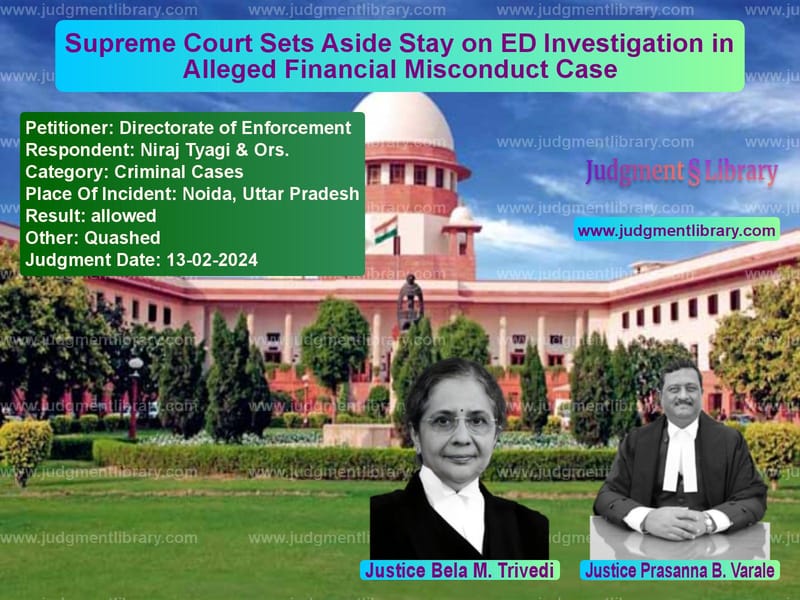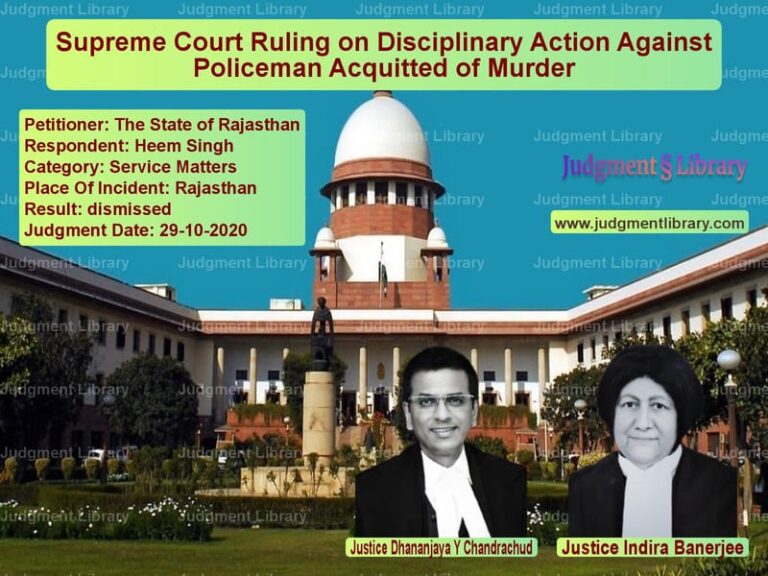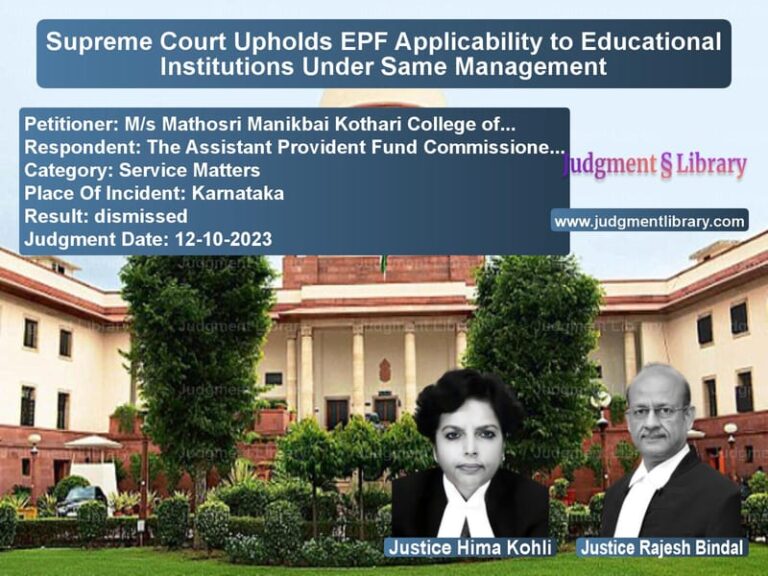Supreme Court Sets Aside Stay on ED Investigation in Alleged Financial Misconduct Case
The Supreme Court of India in Directorate of Enforcement v. Niraj Tyagi & Ors. and related appeals addressed the issue of judicial interference in ongoing investigations. The Court set aside interim orders passed by the Allahabad High Court, which had stayed the proceedings of FIRs and the Enforcement Directorate’s (ED) investigation under the Prevention of Money Laundering Act (PMLA). The ruling reiterates that courts should not obstruct law enforcement agencies unless there is clear abuse of power or manifestly mala fide proceedings.
Background of the Case
The case revolves around financial transactions involving Indiabulls Housing Finance Limited (IHFL) and various borrowers, including the Shipra Group. Multiple loans were granted by IHFL, which later sought to recover dues through legal means. Several FIRs were lodged against IHFL officers, alleging financial fraud, undervaluation of assets, and illegal loan transactions. The Enforcement Directorate (ED) subsequently initiated proceedings under PMLA based on these FIRs.
The respondents, including Niraj Tyagi, Reena Bagga, and M3M India Private Limited, approached the Allahabad High Court, which passed interim orders staying the investigations and barring coercive action against the accused. The Directorate of Enforcement and other parties challenged these orders before the Supreme Court.
Petitioner’s Arguments
The Additional Solicitor General (ASG) representing the ED argued:
- The High Court’s stay orders were contrary to established legal principles laid down in Neeharika Infrastructure Pvt. Ltd. v. State of Maharashtra, which held that courts should not routinely interfere with ongoing investigations.
- ED was not heard before the High Court passed orders staying the proceedings, which violated the principles of natural justice.
- The financial transactions in question involved significant monetary transactions that warranted a detailed investigation under PMLA.
- The accused should have applied for anticipatory bail rather than seeking a blanket stay on investigations.
Respondent’s Arguments
The respondents, including representatives of IHFL and M3M India, contended:
- The FIRs were mala fide and initiated to harass corporate entities after they took legal action to recover dues from borrowers.
- The financial transactions were lawful, and ED’s involvement was unwarranted.
- The High Court’s interim relief was justified, as the allegations primarily concerned civil financial disputes rather than criminal misconduct.
- Under K. Virupaksha v. State of Karnataka, courts have the power to grant interim protection when criminal proceedings appear to be an abuse of process.
Supreme Court’s Observations
The bench, comprising Justices Bela M. Trivedi and Prasanna B. Varale, made strong remarks against the High Court’s orders:
- “It’s a matter of serious concern that despite the legal position settled by this Court in a catena of decisions, the High Court has passed the impugned orders staying the investigations of the FIRs and ECIR in utter disregard of the said settled legal position.”
- “The inherent powers under Section 482 of Cr.PC do not confer an arbitrary jurisdiction on the High Court to act according to whims or caprice.”
- “By passing such orders of staying the investigations, the High Court has granted blanket protection to the accused without them applying for anticipatory bail.”
- The Court reiterated the principles laid down in Neeharika Infrastructure, emphasizing that courts should not interfere with investigations unless the FIRs are ex-facie frivolous.
Key Legal Findings
- The High Court’s stay orders were not in line with settled legal principles governing the quashing of FIRs and the grant of interim relief.
- The accused had an alternative remedy of applying for anticipatory bail rather than seeking a blanket stay on proceedings.
- Judicial comity and discipline require High Courts to adhere to Supreme Court precedents when deciding matters related to criminal investigations.
- The principle of non-interference in investigations was reiterated, except in cases of manifestly false FIRs or abuse of power.
Final Verdict
The Supreme Court set aside the High Court’s stay orders and ruled:
“The impugned orders passed by the High Court being not in consonance with the settled legal position, the same deserve to be set aside and are hereby set aside. The impugned interim orders passed by the High Court qua the concerned respondents-accused in the present appeals stand vacated forthwith.”
The Court clarified that it had not made any determination on the merits of the criminal cases and that the respondents could still contest the allegations through appropriate legal channels.
Implications of the Judgment
The Supreme Court’s ruling has far-reaching implications:
- It reinforces the principle that investigations should not be halted except in exceptional circumstances.
- It sets a precedent for financial institutions and enforcement agencies, ensuring that legal proceedings are not obstructed prematurely.
- It warns against the misuse of Section 482 Cr.PC to seek blanket protection from criminal investigations.
- The decision strengthens ED’s ability to probe financial crimes without judicial roadblocks.
Conclusion
The Supreme Court’s decision in this case serves as a crucial precedent in criminal jurisprudence, ensuring that courts do not interfere unnecessarily in ongoing investigations. By setting aside the stay orders, the Court has reaffirmed the fundamental principle that the criminal justice system must be allowed to function without unwarranted judicial intervention.
Petitioner Name: Directorate of Enforcement.Respondent Name: Niraj Tyagi & Ors..Judgment By: Justice Bela M. Trivedi, Justice Prasanna B. Varale.Place Of Incident: Noida, Uttar Pradesh.Judgment Date: 13-02-2024.
Don’t miss out on the full details! Download the complete judgment in PDF format below and gain valuable insights instantly!
Download Judgment: directorate-of-enfor-vs-niraj-tyagi-&-ors.-supreme-court-of-india-judgment-dated-13-02-2024.pdf
Directly Download Judgment: Directly download this Judgment
See all petitions in Money Laundering Cases
See all petitions in Fraud and Forgery
See all petitions in Judgment by Bela M. Trivedi
See all petitions in Judgment by Prasanna Bhalachandra Varale
See all petitions in allowed
See all petitions in Quashed
See all petitions in supreme court of India judgments February 2024
See all petitions in 2024 judgments
See all posts in Criminal Cases Category
See all allowed petitions in Criminal Cases Category
See all Dismissed petitions in Criminal Cases Category
See all partially allowed petitions in Criminal Cases Category







